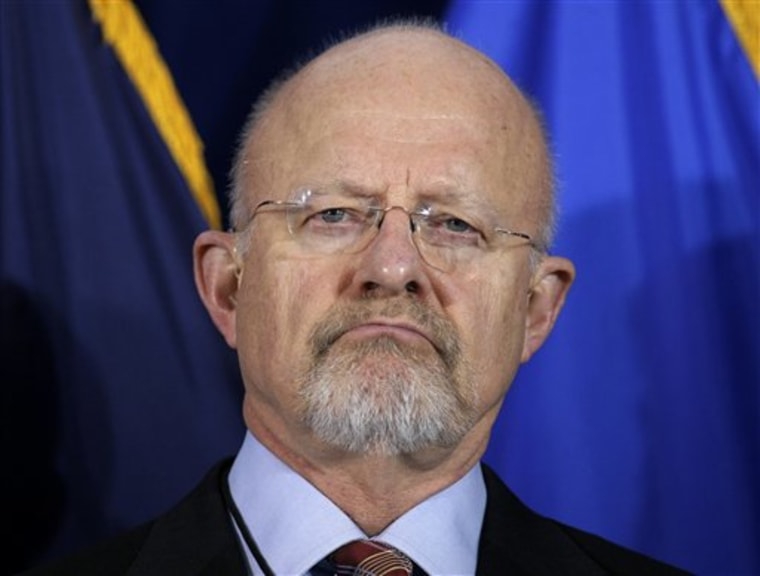Pledging to increase trust with Congress, retired Air Force Lt. Gen. James R. Clapper said Tuesday he would be candid with lawmakers if confirmed as the next director of national intelligence.
Leading senators voiced concerns that the next overseer of the nation's 16 spy agencies faces major challenges caused by the growth of the intelligence community and must be a strong leader who can work well with Congress.
During his confirmation hearing Tuesday before the Senate Intelligence Committee, Clapper also said that his 46 years' experience working in the intelligence field makes him uniquely qualified for the job. He said he would be able to exercise authority over all of the intelligence agencies using the powers the DNI already has, rather than "going through the trauma," of another reorganization.
He said he "would not agree to take the position if I was going to be a titular figure or hood ornament."
Congress created the DNI post in 2004 because of a perceived lack of coordination that preceded the terrorist attacks of Sept. 11, 2001. But critics from the White House to the intelligence community say the intelligence chief's role is ill-defined because lawmakers did not want to give the director the authority to override decisions made by the agencies under his or her purview. They contend that has reduced the DNI's role to what some call "the cajoler in chief."
Clapper sought to defuse criticism from some lawmakers about his many years spent in the military. He noted that he'd been out of uniform for almost 15 years, and that he was once removed from his former position as director of the National Geospatial Agency by former Secretary of Defense Donald Rumsfeld because "I was regarded as too independent."
President Barack Obama nominated Clapper more than six weeks ago after pressing retired Adm. Dennis Blair to step down. During Blair's tumultuous 16-month tenure, he clashed with CIA director Leon Panetta over questions of overlapping authority. Blair was also seen as out of step with the inner national security sanctum led by White House counterterrorism chief John Brennan, who had to preside over the Blair-Panetta wrangles.
Clapper was asked whether he thought he had the power to overrule the CIA director in matters of intelligence. "I do," he answered, adding he'd been reassured by Obama of that authority in a phone conversation before the hearing.
Clapper has faced the nomination process three times before — first as director of the Defense Intelligence Agency, then to lead the National Geospatial-Intelligence Agency, and, most recently, as undersecretary of defense for intelligence.
Clapper has been praised by both Brennan and Panetta as someone they respect and work with regularly in his current role as the Pentagon's top intelligence official. Described as detail-oriented, Clapper is seen as less likely to pick turf battles with agency heads.
But Clapper's critics include the chairwoman of the Intelligence Committee, Sen. Dianne Feinstein, D-Calif., who has complained that his military background is inappropriate for leadership of a mostly civilian intelligence network. Feinstein and some of her Republican colleagues had taken issue with a memo drafted by his Pentagon staff that expresses concern that some authority that would be given to the DNI in the 2010 intelligence authorization bill could encroach on the Defense Department's authority.
Feinstein told Clapper Tuesday that she wanted to make sure he would "wear the mantle of the Director of National Intelligence," and move on from his recent post as the Pentagon's intelligence chief.
Sen. Kit Bond of Missouri, the Intelligence Committee's ranking Republican, also took issue with Clapper's extensive military background as ill-suited to managing the mostly civilian agencies.
Bond said that when Obama called to inform him of Clapper's nomination, "his first selling point was that you were strongly supported by Defense Secretary (Robert) Gates and the Senate Armed Services Committee." Bond said it wasn't the best sales tactic.
"We are happy that the Defense Department and Armed Service Committee love you, but frankly that raises some eyebrows," he said.
Bond also questioned Clapper's public dealings with lawmakers, saying he was "far too reluctant and reactive" in his previous appeances before the committee. And he complained that the White House's counterterrorism chief, John Brennan, has taken up the intelligence oversight role that belongs to the DNI chief.
Bond warned before the hearing that he would consider putting a hold on Clapper's nomination if he's not satisfied with Clapper's responses and with follow-up questions that senators will send to Clapper in the next day or so.
Clapper's hearing was delayed as part of a debate within Congress over whether to prevent the nomination from going forward until the White House signed off on the authorization bill.
Passed in the Senate, the 2010 bill is still in a holding pattern on the House side, as House Speaker Nancy Pelosi, D-Calif., bargains with the administration over further expanding intelligence oversight. In her opening statement, Feinstein urged the House to pass the bill.
Earlier Tuesday, the top two advisers on the 9/11 Commission — former Commission Chairman Tom Kean and Vice Chairman Lee Hamilton — called for Obama to put a similar effort into intelligence reform that he put into health care.
Hamilton said Obama needs to set out how he would clarify the DNI chief's role to give the agency more funding and legal authority.
